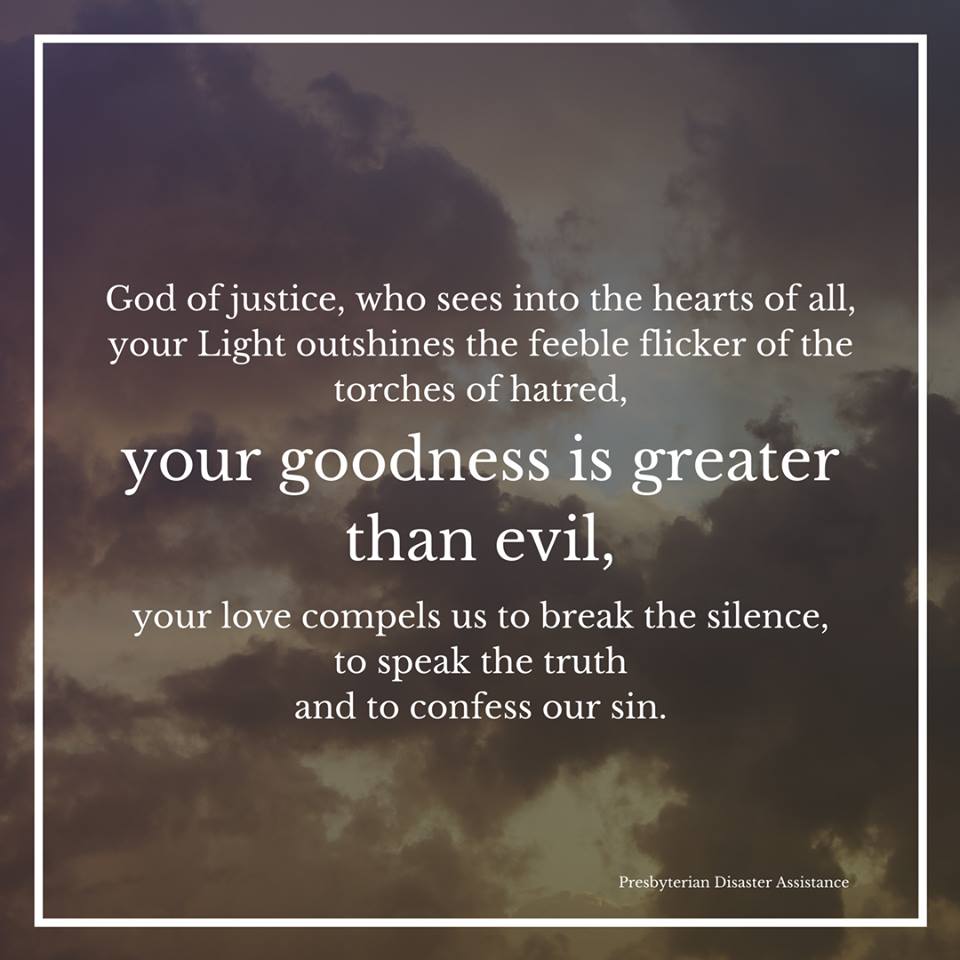“We need to talk.” These four words are a call to attention and have the potential to immediately strike fear in the ears of the listener. Rarely do they mean something positive. “We need to talk” is not often followed by “I love your new haircut” or “I want to give you good news.” Instead, “We need to talk” is followed by the delivering of difficult news: it is the classic introduction to a break-up conversation, a revelation that you have been caught red-handed for some transgression, an indicator that you have done something that is out of bounds, or bad news is going to be delivered. It indicates that something big is happening and a tough conversation is coming.
“We need to talk” should be the header of the second half of today’s text in our Bibles. A woman presents with an urgent plea, shouting for Jesus to help her daughter, and what follows is perhaps one of the toughest conversations recorded in our gospels. And it almost doesn’t happen. The response from Jesus and the disciples initially is silence, ignoring her cries. And when Jesus does respond? It isn’t pretty. In fact, it almost doesn’t sound like Jesus at all. “I was sent only to the lost sheep of the house of Israel.” It is at best a brush-off, a sending away of this woman who does not merit his time or attention. Such a statement is counter to our most basic understanding of Jesus. Where is the Jesus who says “let the little children come to me” and who seemed to pause at every bend in the road to speak to people, much to the disciples’ dismay. Where is the Jesus who stops when a woman who is bleeding touches the hem of his coat, taking time to respond to her needs and offer healing? The one who doesn’t send the crowds away, but instead tells the disciples to give them something to eat? I would like that Jesus, please. Because what we have seems far from it. Then, he makes it worse, not just insinuating, but flat out calling the woman a “little doggie,” a diminutive, derogative term, not worthy of what is given to the privileged children (to be read as the people of Israel) at the table. This is not the Jesus we put on Sunday School classroom walls. In fact, it’s a presentation of Jesus that will get under our skin and make us frustrated and exasperated. It seems callous, mean, and coldhearted. These are not usually words we put with our Lord and Savior.
Perhaps we can find out what is going on by turning our attention to the woman, who isn’t given name, but is described by her ethnic identity. In the version of this story that we find in Mark’s gospel, she is labeled as a gentile, specifically a Syrophoenician (see Mark 7:24-30), identifying her as an outsider. But Matthew’s gospel takes it one step further, identifying her differently, with the label of Canaanite. Such a marker is significant, and would have been especially so to those in the 1st century. You see, it is a biblical reference. There were no Canaanites living in the first century, so:
The label evokes historical conflicts and thus defines the woman in terms of age-old prejudices a first-century Jewish audience would understand[i].
Such tension was inherent to the cultural context of the day, and it reveals a very sobering mirror to those listening, including us. We like to think of Jesus as above all of this, but here we see him at his most fully human. And in this picture of Jesus, we might see ourselves and our own prejudices revealed. We certainly feel the tension that comes in difficult conversations with those with whom we would prefer not to associate.
The writer of the gospel of Matthew places this encounter in a strategic place in the gospel that sets the stage for the woman to enter. After all, Jesus has just finished telling the scribes and Pharisees that it isn’t a strict adherence to purity laws or dietary regulations that makes one part of the covenant; it is the interplay between what is in the heart and the words that come from it. The Canaanite woman’s plea becomes an illustration of this instruction, without losing the inherent tension. It isn’t meant to be an easy application. It is supposed to catch the readers off guard and ruffle their feathers. As pastor Michael Lindvall notes:
Matthew doubtless framed the story he had borrowed from Mark in a way that would help his readers grapple with the tension between those members of his community who understood the gospel of Jesus to be the way for Jews to be faithful Jews and those members who believed that the gospel was intended by God for the whole world. That Jesus effectively articulates both perspectives in this passage served to name the tension and to recognize the truth inherent in both viewpoints[ii].
The struggle in this story, then, is necessary for it to be powerful, because it sets the stage for a new narrative to happen that changes understandings, for both Jesus and the disciples, and the listeners to the good news.
The woman persists. When things are difficult, when disparaging remarks are made, when attempts are there to silence her voice, when the harsh realities of the world are spoken in plain language, the woman does not shy away from the tough conversations that need to happen next. She addresses her need once again, engaging in a sharp and provocative response to Jesus that pushes against all that stands between her and the grace and mercy she seeks. She kneels at his feet and speaks again. Even the dogs get the crumbs. These words, spoken truth to power, along with her faith, enact real and meaningful change. Now we see the Jesus we have come to expect: “Great is your faith!” and healing for her daughter seal the moment.
Lewis Galloway offers that this story “wakes us up from our biblical slumbers” and puts us outside of our comfort zones. He argues that we need to see the Canaanite woman not as an annoyance, but as what he calls a “divine disruption” meant to teach us something. He maintains that:
Disciples of Jesus learn and grow when they brush up against people whose lives, needs, dreams, and struggles are different from their own. The effect of such a relationship is like the effect of sandpaper on a piece of rough wood. It smoothes out the undisciplined edges of life and makes his followers serviceable for some new purpose[iii].
For the first century believers, this story reveals a very rough spot in their understanding of what it mean to live as disciples of Jesus Christ, particularly in contemplating who could or could not be a part of the salvation offered by the Messiah. And Matthew gives them a tough conversation to help illustrate his point and open them to new possibilities. The totality of these verses would have been sandpaper to those who heard it, and it should be the same for us today.
Brothers and sisters, we need to talk. There are countless things happening and going on in the world that prompt us to have conversation with one another. But more often than not, we are silent or dismissive of those things that disrupt our lives and beckon our attention. The issues that have been raised in the wake of what happened in Charlottesville last weekend are not new. They are simply the most recent instance or example. Almost two and a half years ago I was serving a church in Baltimore and watched the news stunned with scenes that were only a few miles from our house. These tensions weren’t new either. Baltimore is a city with a long history of racial tension and struggle that still has implications on a daily basis for its residents. Many tough conversations had already been happening, but these events sparked an opportunity for more people to become a part of sustained conversation about what had brought the area to this breaking point, and what could be done about it going forward. If the news cycles are going to constantly be disrupted by tragedies from the same sin of racism and the same challenges it presents in our country, we need to be less dismissive of them and instead listen for what God might be trying to tell us. Maybe we can embark on these tough conversations before it becomes another headline.
I learned this week about a man who has, for over thirty years, made tough conversations his mission. Daryl Davis[iv] is an accomplished rock musician, with a resume that includes playing piano with the legendary Chuck Barry. But beyond the stage, he engages in tough conversations. Namely, as an African-American man, he has made it an objective in his life to have conversations with and befriend members of the Klu Klux Klan. He has been featured on many newscasts and last year was the focus of a documentary about this work titled “Accidental Courtesy: Daryl Davis, Race, and America[v],” which you can find on Netflix, among other places:
His story is fascinating, as he reveals that his guiding question is and has always been simple: “How can you hate me when you don’t know me?” He models a very different way of engaging issues of racism around the country, which has led to several dozen KKK members leaving the clan, and leaving him with their hoods and robes. He seeks to enact change by establishing dialogue, saying “when two enemies are talking, they’re not fighting.” His work is provocative, and not without controversy or criticism. It has certainly given me a lot to think about, along with many “sandpaper moments.” But, there is one thing about which there is no question; Daryl Davis is willing to have some tough conversations.
Friends, it does not take much for us to be put in positions where we might have some tough conversations. Look around you in this space. We are, by my accounts, what you would call a “purple church.” The political and ideological positions of those who sit in our pews cover virtually the entire spectrum. And that makes it hard, particularly when tensions escalate around us and even within us. Frankly, it’s easier when those around you share your viewpoints. But writer Diana Butler Bass notes that there is great potential for congregations like us. She notes that:
Purple is more than a blend of red and blue, a right-left political hybrid with no color of its own. Purple is an ancient Christian symbol. . . . Christian purple – the color of repentance and humility – represents the kingdom birthed in the martyred church, unified around a crucified savior, and formed by the spiritual authority of being baptized in a community of forgiveness. . . . For Christians, purple is more than a blending of political extremes, a mushy middle. Purple is about power that comes through loving service, laying down one’s life for others, and following Jesus’ path[vi].
Purple, it seems, might have something to do with the vision set forth by the Psalmist in Psalm 133, “How very good and pleasant it is when kindred live together in unity!” It is a psalm that expresses the deep longing and hope for reunification of the Northern and Southern kingdoms. It’s something that hasn’t yet happened, but is yearned for with all of the psalmist’s being. And I believe it is something we yearn for as well. The only way we can possibly get there is to actually talk to each other about it. Even if that is tough.
Tough conversations take many forms. In the case of Daryl Davis, it comes in the way of establishing friendships and simply listening. That’s a great place to begin. In fact, you don’t even necessarily have to talk about those “hot button” issues with each other at first. Just get to know each other’s story. Then, as the friendship develops, you can delve into those deeper waters. In the case of the Canaanite woman, tough conversations come by stripping away pretense and naming difficult realities that push boundaries and place the woman at risk. It’s the proverbial “speaking truth to power,” and is a type of honest engagement that has the ability to bring about lasting change. Both are different methods, but both faithful ways of embodying a faith that allows us to be fully present with each other. Our work right now is not in the easy. It’s in the difficult, heartbreaking, soul-searching, seemingly impossible work of having tough conversations with each other.
Today’s text reminds us that we are called to engage in the tensions and difficult conversations of our time. As people of faith, I would encourage us to try to make these tough conversations ones that are theological. The issues we wrestle with in the world, particularly those of equality and justice, need the theology and love of Jesus Christ infused into them. That’s the model of the Canaanite woman and Jesus. The woman evokes theological terms like “Lord” and “Son of David.” The tough conversation she brings wasn’t just a hot-button issue; it was a crisis of theology. Her begging wasn’t just to have her daughter healed; her begging was a persistent insistence on being included in the love and grace and mercy offered by Jesus Christ. That must be the root of all of our approaches as well.
The work of faith is hard. Tough conversations are all around us. May we not be silent.
~Rev. Elizabeth Lovell Milford
August 20, 2017
——————————————————————————————————
[i] Marilyn Salmon, “Commentary on Matthew 15:[10-20] 21-28,” The Working Preacher, http://www.workingpreacher.org/preaching.aspx?commentary_id=125, accessed 8/17/17
[ii] Michael L. Lindvall, “Theological Perspective: Matthew 15:21-28,” Feasting on the Gospels, Matthew, Volume 2, Chapters 14-28, Cynthia A. Jarvis and E. Elizabeth Johnson, editors, (Louisville, KY: Westminster John Knox Press, 2013).
[iii] Lewis F. Galloway, “Pastoral Perspective: Matthew 15:21-28,” Feasting on the Gospels, Matthew, Volume 2, Chapters 14-28, Cynthia A. Jarvis and E. Elizabeth Johnson, editors, (Louisville, KY: Westminster John Knox Press, 2013).
[iv] http://www.daryldavis.com/#
[v] http://accidentalcourtesy.com/
[vi] Diana Butler Bass, “Not Red, Not Blue…Purple Churches http://www.beliefnet.com/columnists/godspolitics/2006/11/diana-butler-bass-not-red-not.html#t3xkWVFOMuoMdpGe.99, accessed 8/17/17.








